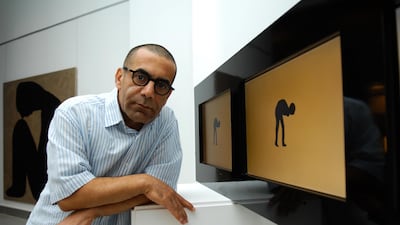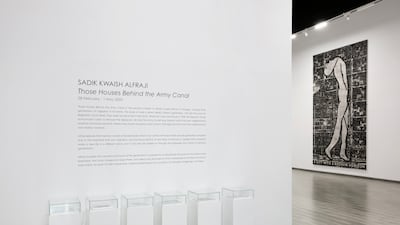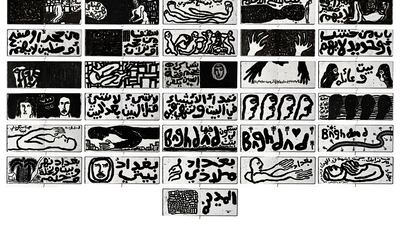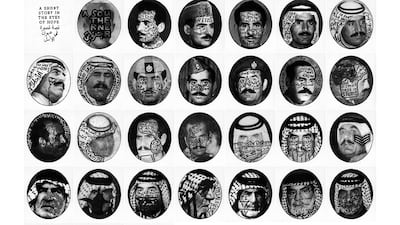Colossal figures roam, float and look back across old maps of Baghdad in the surreal and intensely personal solo exhibition of Dutch-Iraqi artist Sadik Kwaish Alfraji.
Entitled Those Houses Behind the Army Canal, Alfraji’s new body of work, on show at Ayyam Gallery in Dubai's Alserkal Avenue, consists of large-scale paintings, drawings, digital prints and video works.
Alfraji dug deep into the history of his father’s generation in Iraq and the urban changes in Baghdad, melding them with his own memories, personal experiences and the ever-evolving idea of identity, creating a cohesive, yet diverse collection of work.
“I’m very aware that any personal experience is, in truth, a human experience,” Alfraji tells The National.
“It can find a link with others, even if they are from different societies and cultures.”
Through a personal and very specific family history and narrative, Alfraji creates images across mediums that tell universal tales.
“In the end, it’s an experience that belongs to the human experience and we can all be described as just that, human beings,” he adds.
The exhibition is part of Alfraji’s project, Books of Passage, charting three generations of migration in his family.
The first chapter, The River That Was in the South, explored the life of his grandfather’s generation through his own identity.
The current exhibition is the second chapter in this multi-generational narrative, based on his father’s generation, who migrated from the south of Iraq to Baghdad. They were then forced to live in slums until the 1958 coup, after which the Republic of Iraq was declared.
Under this new government, Alfraji’s family were rehoused and forced to move again, this time in a newly built neighbourhood, Madinat al-Thawra, in the outskirts of Baghdad. Despite families being given plots of land, they had to build their own homes using whatever materials they could afford, neighbourhood streets were narrowly built and at first had no drainage system, which caused floods when it rained.
It was a harrowing experience for his father’s generation, who had left the south and now lived in a poorly formed neighbourhood, separated from the rest of the city. Class distinctions were formed and the district today, which is home to more than a million people, is still suffering.
“It was very emotional working on this,” Alfraji says. “I’m dealing with things that are to do with me, my history, my memories, my experience, my emotional history.”
Alfraji was born in Baghdad in 1960 and raised Madinat al-Thawra. He left Iraq in the 1990s, settling in Amersfoort in the Netherlands where he now lives. He has rarely visited Baghdad since leaving.
“The heroes of these stories here are my parents and my family home,” Alfraji says.
“Sometimes, there is crying while researching and creating the work. I have to stop sometimes, because certain phases of the work feel so emotional, I feel suffocated and need to stop.”
Through sketch books, animations, archive material, video footage, drawings and etchings, Alfraji captures the history of his family and the neighbourhood. He creates work by imagining himself in dialogue with his father and grandfather, imagining himself in the city and neighbourhood, through the streets, in the houses, in the trees.
“I look at my personal experiences as a way to make sense of the world,” Alfraji says.
“I am here in this world, obligated to surrender to its conditions. I’m judged by these conditions, and my personal experiences are the experience of a human being who lives and is aware of the demands of existing in this world.”
The result of this emotionally intensive methodology, and Alfraji’s overall vision, is an exhibition that invites the viewer to walk into what feels like a deeply sacred narrative, a series of stories within stories, that balance the personal and emotional with conceptual ideas.
“I cannot separate ideas from emotions,” Alfraji says.
“The idea has to have an emotional root, and the emotions must have a side that has a conceptual idea. It’s a delicate and balanced thing.”
Alfraji reflects this balance between emotions and ideas in his work across a range of mediums with a singular synergy of style and a unique visual language.
Emotions and ideas shift and are in dialogue with another, from the smallest drawings, pages from his sketch books to the large-scale paintings of Alfraji’s recognisable shadowy figure roaming a Baghdad map.
“There is always an interaction between the two which is what makes my work understood or felt by others even if they are from a different culture or intellect,” he says.
“The human experience in the world is a combination of ideas and emotions that we cannot separate. My work exists in this space, and I use my own personal experiences to communicate that.”
Sadik Kwaish Alfraji's exhibition Those Houses Behind the Army Canal, is at Ayyam Gallery in Alserkal Avenue, Dubai until May 1











